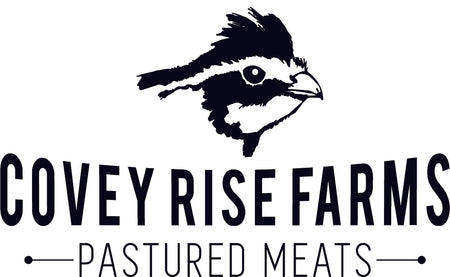If you've been to the meat aisle of your local grocery store lately, you've probably seen packaging with all sorts of fancy words like "all-natural," "free-range," "organic," "farm fresh," or "grass-fed." Many of these phrases have no real meaning or regulation behind them and are deceiving customers.
Greenwashing is a marketing strategy in which producers use "green" buzzwords trust to create a false persona in order to attract customers and gain business and customer trust . Let's dive into common phrases found on meat in the grocery store and which ones you want to prioritize.
- Grass-fed: This is probably the most misleading label found on meat in the grocery store. All cows are fed grass at some point in their lives; however, many are finished on corn, soy, or a grain-based feed. Because the term "grass-fed" is not regulated, companies can put it on their products even if the cow is not exclusively fed grass. If you are looking for purely grass-fed beef, look for labels that say "100% grass-fed" or "grass-fed and finished." Or, even better, find a local farmer (like us) who you can talk to about their farming practices. Our cows are not 100% grass-fed and finished, but they are on pasture their entire life. They are only provided a corn supplement after they are a year old, to add more flavor to the finished product.
- Vegetarian-fed: Although this phrase seems like a good thing, the "vegetarian-fed" does not tell the consumer anything about the farming practices. It simply implies that the animals' feed did not include other animal byproducts. What this could also mean is that the animal had a "controlled" environment, which actually could mean no outdoor access or pasture of any kind.
- Cage-free: "Cage-free" is a phrase commonly seen on egg cartons or packages of chickens. Many people make the mistake of thinking "cage-free" and "pasture-raised" are synonymous, but this couldn't be further from the truth. Most of the time, chickens are not raised in cages; however, they often live in confinement with limited or no outdoor access. Companies can use the term "cage-free" while still having their chickens live in cramped environments.
- Pasture-raised: Implies that chickens were free to roam on pasture; however, it does not have any legal definition and is not a regulated term. Pasture raised can mean a variety of things, including animals with "access" to the outdoors, those finished on feedlots, or other miss leading practices
- Free-range: The USDA’s (and industry standard) definition for “Free Range” is that birds must have “outdoor access” or “access to the outdoors.” In some cases, this can mean access only through a “pop hole,” with no full-body access to the outdoors and no minimum space requirement. This is slightly better than "cage-free," it doesn't specify what outdoors means. Frequently, "outdoors" means a small area with little to no grass, bugs, or other beneficial creatures.
- All-natural: This phrase may be one of the most meaningless of them all. "All-natural" means that your product is minimally processed and has no artificial ingredients or additives. It does not tell you anything about the farming practices and often is used for animals held in feed lots.
- Organic: Organic is one of the few phrases with legal weight to it. This term means that the product was produced without using chemicals, antibiotics, hormones, and pesticides. Organic is very important in terms of fruits and vegetables; however, you can buy organic beef raised in a feedlot. Organic does not equate to grass-fed and finished or pasture-raised.
Trying to navigate all of the green-washing labels out there can be exhausting and frustrating, especially when trying to buy a healthy product for your family and the environment. Here are 7 Green Washing terms to help you understand food terms, and farming practices.

